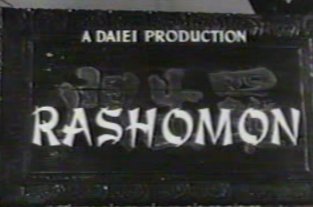
Rashomon
Rating: 8/10
Year: 1951
Genre: Mystery
Director: Akira Kurosawa
Cast: Toshiro Mifune, Takashi Shimura, Machiko Kyo, Masayuki Mori, Minoru Chiaki
Before Rashomon, Japanese Cinema was unknown to the rest of the world. It is this film that introduces Japanese films to the audience all over the world; it is this film that allows us to appreciate the beauty of Japanese Cinema for the first time.
Rashomon is definitely not an easy film to grasp. The story is about the investigation of the death of a Samurai. Different versions of the incident are presented by several related figures, the bandit (Toshiro Mifune), the wife of the Samurai (Machiko Kyo), the spirit of the Samurai (Masayuki Mori) via a medium, the cop (Daisuke Kato) and the woodcutter (Takashi Shimura), of this incident. The film does not end up telling the viewers which version represents the truth.
Best known as the most famous Kurosawa film in the West, what makes Rashomon interesting is not merely the story of the film, but the question raised by Kuroawa through this story. Kurosawa's films always carry a message, it is different from the films of Yasujiro Ozu or Kenji Mizoguchi in which they love to deal with family or interpersonal relationship. Kurosawa loves to explore the possibility of human nature. As compared with Ozu and Mizoguchi, I would say that his concern is more individual and internal to a certain extent, and this theme is being exhibited in this film.
In this film, as Mitsuhiro Yoshimoto suggests in his book Kurosawa, one of the most important issues for Kurosawa is egotism. I think it explains why the bandit, the wife and the husband all plead guilty of the murder. In normal circumstance, people usually lie in order to escape punishment. But there is no shifting of blame in this case. None of them seems to be afraid of death penalty or other harsh punishment. Whether they lie or not, egotism is probably the best explanation of their behaviors. Their testimonies give us an inflated sense of their own importance.
Another issue that Kurosawa wants to convey is hope. Although human nature contains weakness (for instance, the cunning and deceptive woodcutters and the egotistic bandit and wife show the bad side of human being), nevertheless, Kurosawa still reminds us of hope through the ending of the film. The promise of the woodcutter to raise the child strengthens this idea of hope and recovers our faith successfully. The message is especially effective after the frustrating experience of being exposed to the horrible and dark side of human nature. It seems that Kurosawa wants us to know that not all men are evil. We should not give up. There is still hope and we should count on it.
VCD (Taiwanese version) - I got the VCD from a Taiwanese bookstore. This is not a bootleg version (although the cover design sucks), and the VCD has Chinese subtitles only, but it is too obvious that this version of the film is copied from an English version, since the distributor masks the English subtitles by putting the Chinese subtitles on top of it.
Cool guy(s) - Toshiro Mifune, Takashi Shimura, Masayuki Mori
Reviewed by: Kantorates